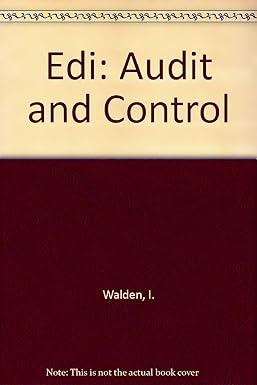Question
Case Study Cloud 9 - 4 (Part 1 Materiality) W&S Partners commenced the planning phase of the Cloud 9 audit with procedures to gain an
Case Study Cloud 9 - 4 (Part 1 Materiality)
W&S Partners commenced the planning phase of the Cloud 9 audit with procedures to gain an understanding of the clients structure and its business environment. You have completed your research on the key market forces as they relate to Cloud 9's operations. The topics you researched included the general and industry-specific economic trends and conditions; the competitive environment; product, customer, and supplier information; technological advances and the effect of the Internet; and laws and regulatory requirements. The purpose of this research is to identify the inherent risks. The auditor needs to identify which fi nancial statement assertions may be affected by these inherent risks. Identifying the risks will help determine the nature of the audit procedures to be performed. Management implicitly or explicitly makes assertions regarding the recognition, measurement, presentation, and disclosure of the various elements of the financial statements. Auditors use assertions for account balances to form a basis for the assessment of risks of material misstatement. That is, assertions are used to identify the types of errors that could occur in transactions that result in the account balance. Consequently, further breaking down the account into these assertions will direct the audit effort to those areas of higher risk. The auditors broadly classify assertions as existence or occurrence; completeness; valuation or allocation; rights and obligations; and presentation and disclosure. An additional task during the planning phase is to consider the concept of materiality as it applies to the client. The auditor will design procedures in order to identify and correct errors or irregularities that would have a material effect on the financial statements and affect the decision-making of the users of the financial statements. Materiality is used in determining audit procedures and sample selections, and in evaluating differences from client records to audit results. It is the maximum amount of misstatement, individually or in aggregate, that can be accepted in the financial statements. In selecting the base figure to be used to calculate materiality, an auditor should consider the key drivers of the business and ask, What are the end users (that is, shareholders, banks, and so on) of the accounts going to be looking at? For example, will shareholders be interested in profit figures that can be used to pay dividends and increase share price? W&S Partners' audit methodology dictates that one planning materiality (PM) amount is to be used for the financial statements as a whole. Further, only one basis should be selecteda blended approach or average should not be used. The basis selected is the one determined to be the key driver of the business. W&S Partners use the percentages in table 4.9 as starting points for the various bases. TABLE 4.9 Starting percentages for materiality bases
| BASE | THRESHOLD (%) | |
| Profit before tax | 5.0 | |
| Revenues | 0.5 | |
| Gross profit | 2.0 | |
| Total assets | 0.5 | |
| Equity | 1.0 |
These starting points can be increased or decreased by taking into account qualitative client factors, such as:
| the nature of the clients business and industry (for example, rapidly changing through growth or downsizing, or because of an unstable environment | ||
| the client is a public company (or subsidiary of) that is subject to regulations | ||
| the knowledge of or high risk of fraud |
Typically, profit before tax is used; however, it cannot be used if reporting a loss for the year or if profitability is not consistent. When calculating PM based on interim figures, it may be necessary to annualize the results. This allows the auditor to plan the audit properly based on an approximate projected year-end balance. Then, at year end, the figure is adjusted, if necessary, to reflect the actual results. Answer the following questions based on the information presented for Cloud 9 in Appendix B. Click here to view Appendix B (a) Using the December 31, 2016 trial balance (in Appendix B), calculate planning materiality. (Round answers to 0 decimal places, e.g. 5,275.)
| Planning Materiality | $ |
Step by Step Solution
There are 3 Steps involved in it
Step: 1

Get Instant Access to Expert-Tailored Solutions
See step-by-step solutions with expert insights and AI powered tools for academic success
Step: 2

Step: 3

Ace Your Homework with AI
Get the answers you need in no time with our AI-driven, step-by-step assistance
Get Started


